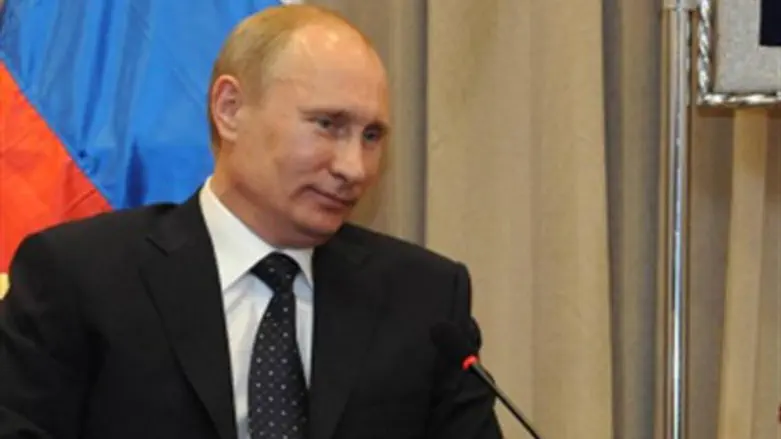
Russian President Vladimir Putin hinted on Wednesday his country may support a UN resolution on punitive military strikes in Syria if it is proved that Damascus used poison gas on its own people.
At the same time, Putin warned the West, in a wide-ranging interview with the Associated Press and Russia’s state Channel 1 television, against taking one-sided action in Syria.
The Russian leader said he felt sorry that President Barack Obama canceled a one-on-one meeting in Moscow that was supposed to have happened before the G-20 summit, but expressed hope that the two would have serious discussions about Syria and other issues in St. Petersburg.
“We work, we argue about some issues. We are human. Sometimes one of us gets vexed. But I would like to repeat once again that global mutual interests form a good basis for finding a joint solution to our problems,” he said.
Putin said it was “ludicrous” that the government of Syrian President Bashar Al-Assad — a staunch ally of Russia — would use chemical weapons at a time when it was holding sway against the rebels.
“From our viewpoint, it seems absolutely absurd that the armed forces — the regular armed forces, which are on the offensive today and in some areas have encircled the so-called rebels and are finishing them off — that in these conditions they would start using forbidden chemical weapons while realizing quite well that it could serve as a pretext for applying sanctions against them, including the use of force,” he said.
Dismissing U.S. intelligence reports which fingered the Assad regime as being behind the chemical attack on August 21, Putin said the U.S. has failed to make its case through the proper channels.
“If there is evidence that chemical weapons have been used, and used specifically by the regular army, this evidence should be submitted to the UN Security Council,” he said. “And it ought to be convincing. It shouldn’t be based on some rumors and information obtained by intelligence agencies through some kind of eavesdropping, some conversations and things like that.”
He noted that even in the U.S., “there are experts who believe that the evidence presented by the administration doesn’t look convincing, and they don’t exclude the possibility that the opposition conducted a premeditated, provocative action trying to give their sponsors a pretext for military intervention.”
He compared the evidence presented by Washington to false data used by the Bush administration about weapons of mass destruction to justify the 2003 invasion of Iraq.
“All these arguments turned out to be untenable, but they were used to launch a military action, which many in the U.S. called a mistake. Did we forget about that?” Putin said.
He added that he “doesn’t exclude” backing the use of force against Syria at the United Nations if there is objective evidence proving that Assad’s regime used chemical weapons against its people.
At the same time, Putin strongly warned Washington against launching military action without UN approval, saying it would represent an aggression.
Asked what kind of evidence on chemical weapons use would convince Russia, Putin said “it should be a deep and specific probe containing evidence that would be obvious and prove beyond doubt who did it and what means were used.”
Amid reports that Russia was sending a missile cruiser to the east Mediterranean to take over the navy's operations in the region, Putin said it is premature to talk about what Russia would do if the U.S. attacked Syria.
“We have our own ideas about what we would do and how we would do it if the situation develops toward the use of force or otherwise,” he said. “We have our plans, but it’s too early to talk about them.”
Addressing the S-300 advanced missile system that his country sold Syria, Putin said the missile system is “a very efficient weapon” and said that Russia had a contract for its delivery of the S-300s to Syria.
“We have supplied some of the components, but the delivery hasn’t been completed. We have suspended it for now,” he said.
“But if we see that steps are taken that violate the existing international norms, we shall think how we should act in the future, in particular regarding supplies of such sensitive weapons to certain regions of the world,” added Putin.
(Arutz Sheva’s North American Desk is keeping you updated until the start of Rosh Hashanah in New York. The time posted automatically on all Arutz Sheva articles, however, is Israeli time.)